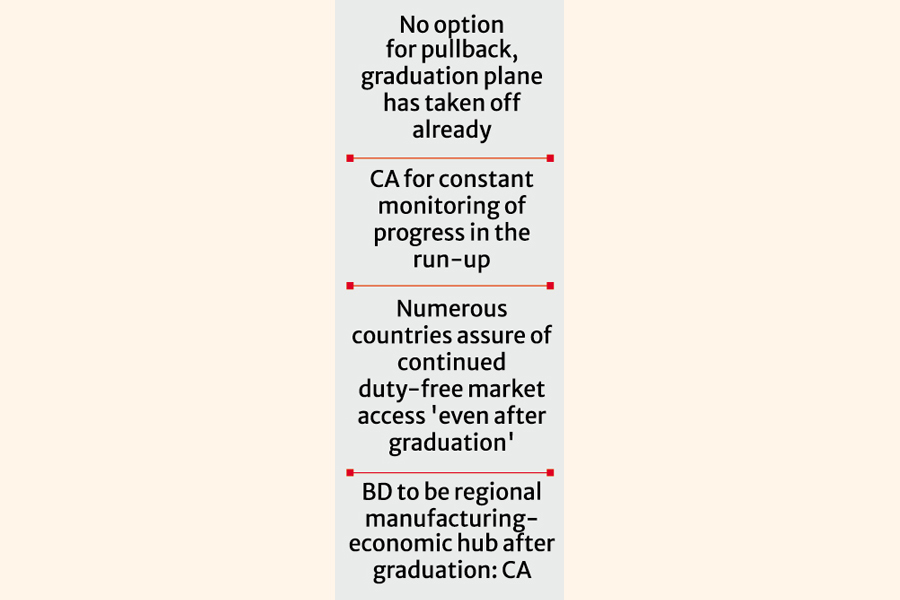
Published :
Updated :

There is no going back for Bangladesh in its LDC graduation as the plane of status change has already taken off, a top-level meeting noted Tuesday and decided on measures to maximise its trade-economic benefits.
"One should keep it in mind that we are not on the ground--we are flying to the crew side. We were supposed to take off in 2024 but we got extra years due to the Covid," said special assistant to the Chief Adviser on finance Anisuzzaman Chowdhury in metaphorical terms after the meeting.
He was briefing the press on the review meeting on LDC graduation with Chief Adviser of the interim government Professor Muhammad Yunus presiding, explaining why the country cannot defer the graduation now when it is on the cusp of a domestic political transition.
"After reviewing the preparations we have been satisfied that our plane will fly smoothly, we have not seen that much possibility of a crash, and we will be able to reach the crew side by 2026," Mr Chowdhury, the head of an expert committee on LDC graduation, told reporters at the press briefing narrating the outcome of the review.
Advisers of the interim government from finance, commerce, education, planning, environment, and education ministries, the central-bank governor, the special assistant to the CA on economic affairs and the BIDA executive chairman were present at the meeting.
"There is no other option now. In today's meeting we discussed about our preparation in detail. And we have identified our strengths and weaknesses," he said.
"There can be pressure on our employment, on private sector, and we have to take precautions to address these," he added.
Responding to a question on possible challenges, he said building institutional capacity for trade negotiation is the top-most challenge for the post-graduation period.
"To address this, the meeting has decided to immediately set up a separate trade-negotiation agency. The chief adviser has instructed the meeting to find out an experienced and capable person to head this trade-negotiation body."
He also said professionals from government and from private sector would be incorporated into the proposed negotiation agency, which will be launched within a very short time.
Asked about demand from different trade bodies for deferring the graduation, he said deferment is out of question now and all have to understand that the country's plane of graduation is already in flying mode.
He also argues on this score that many fear of losing duty-free market access during the post-graduation period but already a number of countries have told Bangladesh that they will continue the facility for Bangladesh even after the graduation.
The European Union, a critical market for Bangladesh, has agreed to extend the duty-free facility after the graduation, he reminds. Australia and Japan have told (us) the same.
"And during the recent investment summit, the United Kingdom mentioned they will provide us with the duty-free facility even after the graduation," he says to make his point that deferment is not necessary.
In this connection he mentions that poorer countries like Bhutan and Samoa have already graduated from the LDC status.
Terming the Trump tariffs a major turbulence, he said efforts had been initiated to address the situation and the challenges of the US tariffs would not only be for Bangladesh but also for other countries as well.
Regarding the assessment that the country will lose US$10 billion in export earnings after graduation he said this figure was based on static data because this does not include the perspective that many of the major importers will continue to extend duty-free facilities.
Responding to a question on managing the impact of graduation on foreign aid as Bangladesh will be deprived of the concessional loan during the post-graduation era, he quipped dependence on aid is a "colonial hangover" and Bangladesh needs to get out of this spell.
He mentions that due to this dependency on foreign aid the country's tax-GDP ratio could not be raised.
Owing to an aid spree initiated after 2010, the tax-to-GDP ratio got reduced from 10 per cent in 2010 to 6.0 per cent, he said, adding that domestic resource mobilisation must be enhanced to ensure sustainable development.
Asked about the advantages of graduation, he said it would help in attracting foreign investment and in fulfilling the dream of turning the country into a manufacturing hub.
Shafiqul Alam, press secretary to the CA, said during the nearly two-hour meeting, the Chief Adviser directed all concerned to take steps to ensure maximum benefits as Bangladesh remains confident of smoothly graduating from the LDC status.
Prof Yunus mentioned that Bangladesh would be a "manufacturing and economic hub in the region" and discussed how to make it in a better way after the graduation from the club of world's least-developed countries.
The press secretary said the Chief Adviser also stressed the need for constant monitoring by a dedicated team so that no turbulence is seen on this journey as "it is very critical part".
mirmostafiz@yahoo.com


 For all latest news, follow The Financial Express Google News channel.
For all latest news, follow The Financial Express Google News channel.